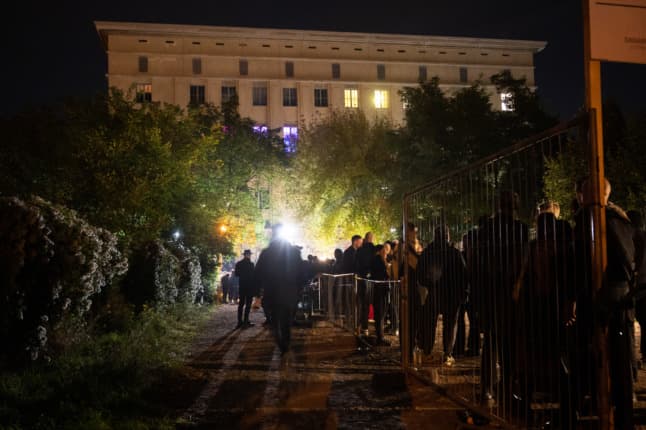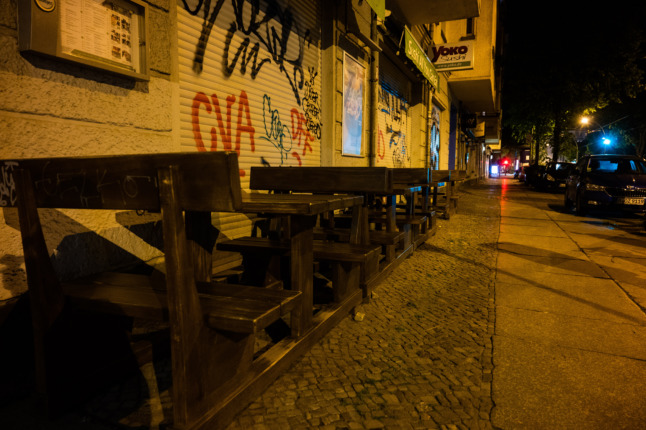Berlin tightens Covid rules with dancing ban

After a few months of respite for Berlin's famous clubs, the city state is to reintroduce its famous dancing ban - through nightlife will remain open, at least for the time being.
The reintroduction of the dancing ban is part of a number of new restrictions that were agreed by the Berlin Senate on Friday and which are set to come into force on Wednesday, December 8th.
The Tanzverbot, or dancing ban, harks back to the spring of 2021 when clubs were first allowed reopen after a long hiatus. While people were allowed to gather at clubs to socialise and drink, dancing to the music was strictly forbidden.
This rule was eventually scrapped on August 20th after a court found it to be disproportionate.
Now, as the fourth wave continues to make its presence felt, it is set to return.
READ ALSO: Techno, Testing and Tanzverbot: What it’s like to go to Berlin’s clubs under Covid rules
No bar closures - yet
In light of spiralling infections in the capital, the Senate had previously agreed that it wanted to shut down Berlin's nightlife, restaurants and cultural venues. However, blanket closures of businesses aren't currently allowed under the amended Infection Protection Act.
States lost the power to enforce measures such as alcohol bans, curfews, lockdown and blanket closures of pubs and clubs when the 'epidemic situation of national importance' expired on November 25th.
Though the incoming government agreed on Thursday to grant states the power to close businesses when infections are high, those changes haven't yet been signed into law.
According to Christian Gaebler, Head of the Senate Chancellery, this is why a dancing ban is set to come into force as opposed to widespread closures of clubs and bars.
The German parliament is expected to put through an amendment to the Infection Protection Act that would allow states to order the closures of bars, restaurants and clubs at weekly incidences of more than 350 per 100,000 people.
As of Friday, the 7-day incidence of Covid cases in Berlin was 360 per 100,000 people.
According to the German parliamentary diary, these changes will be discussed in the Bundestag on December 9th - a day after Olaf Scholz is voted in as Chancellor.
Should they be put through parliament the same week - and assuming the incidence in Berlin doesn't drop below 350 - sweeping closures could come into force in Berlin ahead of Christmas.

Shuttered bars in the Berlin district of Friedrichshain during the nighttime curfew in May 2021. If changes to the Infection Protection Act go through, Berlin could order blanket bar closures. Photo: picture alliance/dpa | Christophe Gateau
Restrictions for the unvaccinated
Other measures decided on Friday include contact restrictions for the unvaccinated, an upper limit of 5,000 attendees at outdoor public events and the obligation to present a certificate of vaccination or recovery or a negative test ('3G') in order to play contact sports outdoors.
The 3G rule will also apply at public administrative buildings such as the Bürgeramt.
A system known as '2G' in which people are required to present a certificate of vaccination or recovery will continue to apply at non-essential shops and other public indoor spaces. In addition, a blanket 2G rule will be brought in at Christmas markets.
The Senate is currently formulating plans to restrict crowding and enable social distancing in restaurants so that gastronomy can remain open even when infection rates are high.
Meanwhile, meetings where at least one unvaccinated person is present will be restricted to one household and a maximum of two other people.
READ ALSO: KEY POINTS: Germany’s new Covid rules to fight fourth wave
It is important to keep in mind "what it means to be unvaccinated now", Berlin Mayor Michael Müller said at a press conference announcing the changes.
"Restricting the vaccinated won't work," he added. "The unvaccinated are the ones who are restricted in their range of movement, in public and in private."
Comments
See Also
The reintroduction of the dancing ban is part of a number of new restrictions that were agreed by the Berlin Senate on Friday and which are set to come into force on Wednesday, December 8th.
The Tanzverbot, or dancing ban, harks back to the spring of 2021 when clubs were first allowed reopen after a long hiatus. While people were allowed to gather at clubs to socialise and drink, dancing to the music was strictly forbidden.
This rule was eventually scrapped on August 20th after a court found it to be disproportionate.
Now, as the fourth wave continues to make its presence felt, it is set to return.
READ ALSO: Techno, Testing and Tanzverbot: What it’s like to go to Berlin’s clubs under Covid rules
No bar closures - yet
In light of spiralling infections in the capital, the Senate had previously agreed that it wanted to shut down Berlin's nightlife, restaurants and cultural venues. However, blanket closures of businesses aren't currently allowed under the amended Infection Protection Act.
States lost the power to enforce measures such as alcohol bans, curfews, lockdown and blanket closures of pubs and clubs when the 'epidemic situation of national importance' expired on November 25th.
Though the incoming government agreed on Thursday to grant states the power to close businesses when infections are high, those changes haven't yet been signed into law.
According to Christian Gaebler, Head of the Senate Chancellery, this is why a dancing ban is set to come into force as opposed to widespread closures of clubs and bars.
The German parliament is expected to put through an amendment to the Infection Protection Act that would allow states to order the closures of bars, restaurants and clubs at weekly incidences of more than 350 per 100,000 people.
As of Friday, the 7-day incidence of Covid cases in Berlin was 360 per 100,000 people.
According to the German parliamentary diary, these changes will be discussed in the Bundestag on December 9th - a day after Olaf Scholz is voted in as Chancellor.
Should they be put through parliament the same week - and assuming the incidence in Berlin doesn't drop below 350 - sweeping closures could come into force in Berlin ahead of Christmas.

Shuttered bars in the Berlin district of Friedrichshain during the nighttime curfew in May 2021. If changes to the Infection Protection Act go through, Berlin could order blanket bar closures. Photo: picture alliance/dpa | Christophe Gateau
Restrictions for the unvaccinated
Other measures decided on Friday include contact restrictions for the unvaccinated, an upper limit of 5,000 attendees at outdoor public events and the obligation to present a certificate of vaccination or recovery or a negative test ('3G') in order to play contact sports outdoors.
The 3G rule will also apply at public administrative buildings such as the Bürgeramt.
A system known as '2G' in which people are required to present a certificate of vaccination or recovery will continue to apply at non-essential shops and other public indoor spaces. In addition, a blanket 2G rule will be brought in at Christmas markets.
The Senate is currently formulating plans to restrict crowding and enable social distancing in restaurants so that gastronomy can remain open even when infection rates are high.
Meanwhile, meetings where at least one unvaccinated person is present will be restricted to one household and a maximum of two other people.
READ ALSO: KEY POINTS: Germany’s new Covid rules to fight fourth wave
It is important to keep in mind "what it means to be unvaccinated now", Berlin Mayor Michael Müller said at a press conference announcing the changes.
"Restricting the vaccinated won't work," he added. "The unvaccinated are the ones who are restricted in their range of movement, in public and in private."
Join the conversation in our comments section below. Share your own views and experience and if you have a question or suggestion for our journalists then email us at [email protected].
Please keep comments civil, constructive and on topic – and make sure to read our terms of use before getting involved.
Please log in here to leave a comment.